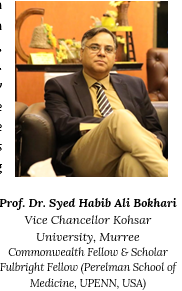Universities which evolved from their initial creation in medieval Europe and has spread around the globe and halcyon days (generously funded times) are no longer the role models, in their initial original forms, for newly emerging universities. Exciting new forms of universities not only need to meet new challenges of new century arising from disruptive ad innovate technologies hence requiring radical overhauling of governance & management. Modern universities are acting as incubations centers for future businesses, technologies, and products, having the capacity to harness the true commercial potential of knowledge and ideas & Partnerships and promoting entrepreneurship Ecosystem in universities taking new meaning & heights in recent times across the world. In this regard, the vision of Vice Chancellor Prof. Dr. Syed Habib Ali Bokhari is translated to reality i.e., to bring onboard top notch foreign professor/giants of their field from top ranked Universities, as affiliate faculty of Kohsar University Murree.
International-Affiliate Faculty at KUM
World-Class Affiliate faculty/top ranked university Professors from multiple disciplines often bring specialized knowledge and expertise in specific areas that enhances the academic offerings of a university. Their affiliations cannot only facilitate collaborative partnerships and networking opportunities for the university but will also strengthen the learning system and the process of education dissemination e.g., e-learning methods & evolving pedagogical approaches. This can lead to research collaborations, internships, guest lectures, and other forms of engagement that benefit students, faculty, and the institution.
Affiliate faculty members often bring specialized knowledge and expertise in specific areas that can enhance the academic offerings of a university and in this regard the new initiative by Kohsar University Murree of having world-class foreign affiliate faculty not only to enhance its internationalization but to develop collaborative linkages to create opportunities for its student body and faculty. We strongly believe that association of top educationist, researchers, professor of practice and entrepreneurs as affiliate faculty will not only improve quality but also help creating an Ecosystem of “interdisciplinary work” in niche areas and emerging fields.
Professor Brendan W. Wren (FRCPath)
Affiliated faculty-Faculty of Biomedical & Life Sciences
(Department of Microbiology)
Faculty of Infectious and Tropical Diseases
Co-Director of the LSHTM Vaccine Centre
London School of Hygiene and Tropical Medicine
Brendan Wren’s research interests predominantly involve determining the genetic basis by which bacterial pathogens cause disease, how they interact with their respective hosts, and how they evolve. A core interest includes studying glycosylation and glycostructures and how this relates to the survival and virulence of bacterial pathogens. An application of this basic research is the development of Protein Glycan Coupling Technology and other glycobiotechnological innovations to produce recombinant glycoproteins. This has been applied to the development of inexpensive glycoconjugate vaccines for human and veterinary use.
Dr. Mona Bajaj-Elliott
Affiliated faculty-Faculty of Biomedical & Life Sciences
(Department of Microbiology)
Associate Professor
Department of Infection, Immunity & Inflammation
Faculty of Population Health Sciences
University College London GOS Institute of Child Health
Dr. Elliott’s research interests include understanding Clostridium difficile-mediated antibiotic-associated diarrhea and related complications, which currently represent a significant health burden in the developed world. Understanding Campylobacter jejuni (a commensal of chicken gut)-mediated disease pathogenesis. Currently, this bacterium is the major cause of bacterial gastroenteritis worldwide. The mechanisms by which enteropathogens manipulate important cellular processes in the host, specifically the inflammasome and autophagy machinery, to effectively evade the immune system in the context of Inflammatory Bowel Disease (Crohn’s Disease and Ulcerative Colitis). Investigating potential biomarkers for gut allergic diseases and their identification in the context of the gastrointestinal tract.
Dr. Ozan Gundogdu
Affiliated faculty-Faculty of Biomedical & Life Sciences
(Department of Microbiology)
Assistant Professor
Enteric Pathogens, Microbiology / Bioinformatics
London School of Hygiene and Tropical Medicine
Dr. Ozan leads the foodborne enteric pathogens group at the LSHTM where the group studies the physiology and pathogenesis of Campylobacter (the most common bacterial cause of human gastroenteritis in the world) and other related enteric microorganisms (e.g., Listeria spp. and Vibrio spp.). Importantly, they translate fundamental microbiological knowledge to real-life settings (i.e., by implementing intervention strategies). They use classical molecular microbiology techniques, and link bioinformatics skills by applying cutting-edge omics-based approaches e.g., genomics, transcriptomics, and metagenomics to answer relevant research questions.
Prof. Dr. Qammer H. Abbasi
Affiliated faculty-Faculty of Applied Sciences & Computing
(Department of Computer Science)
Professor
Executive Director of Communications Sensing, and Imaging Hub University of Glasgow and Deputy Theme Lead Quantum Technologies at Advance Research Centre
Dr. Qammer Abbasi is a renowned researcher with diverse interests in the field of antennas for 5G and 6G, Bio-Electromagnetics, nano communication, Reconfigurable intelligent surfaces, Terahertz sensing, internet of things, biomedical applications of millimeter and terahertz communication, wearable and flexible sensors, antenna interaction with human body, Implants, body centric wireless communication issues, non-invasive health care solutions, physical layer security for wearable/implant communication.





